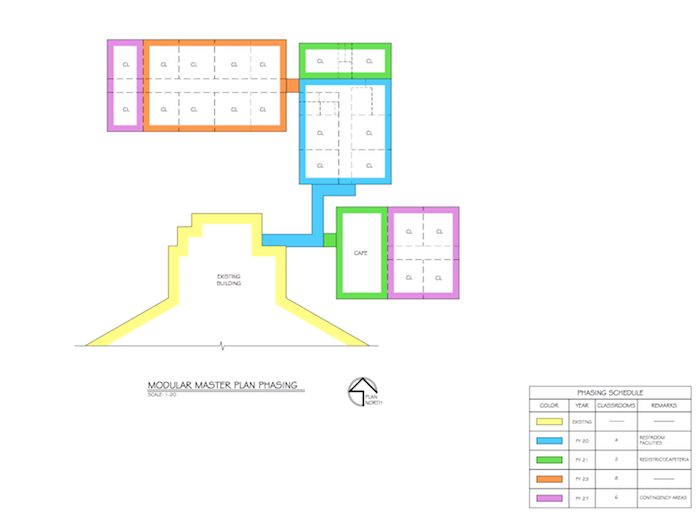At its April meeting, the Gorham Town Council rejected a request from the School Committee (SC) to authorize a June referendum for funding modular classrooms at Narragansett Elementary School. Although $1.1 million for Phase I of the project was included in the SC FY20 budget request, any capital project costing more than $250,000 must receive a referendum vote.
All three elementary schools are currently at or over capacity. Next year Narragansett will put partitions in an existing multi-use space to create two classrooms. According to enrollment projections, during the next two years the district will gain more than 60 students at the K-5 level.
“We need to address this growth now,” said Superintendent Heather Perry, “not next year or the year after or four years down the road.”

The above graphic details the Modular Master Plan Phasing for Narragansett School.
The referendum would have asked voters to approve funding for a two-phase project. Phase I (shown in blue) consists of site work including corridors linking modulars to the school and preparing rented modulars for four classrooms and two bathrooms in FY20. Two additional classrooms and a cafeteria were in the second phase planned for FY21 (shown in green). The estimated funding recommended for referendum was $1.7 million.
Perry hopes that a joint meeting on April 29 between the SC and the Town Council (TC), which voted 4-2 against a referendum, will result in a plan for going forward.
Some TC members had questioned the cost for a temporary solution to the problem of inadequate space. Perry said that the plan “all along has been for these modular spaces to last us between 10 and 15 years.”
In the next Department of Education application cycle, the district will apply for state funding to enlarge Narragansett, a centrally located school with enough land for expansion. Even if funded, it would “likely be seven years out and that is if everything works out perfectly,” Perry said.
TC members also asked if it would be more cost effective to purchase the modulars rather than rent them. Councilor Lee Pratt said he was not against modulars but against leasing them, particularly as so much would be invested in making them ready for occupancy. “I would like to own them as a town,” he said, “so they can be moved to address future overcrowding.”
Under the present plan, the district would be able to purchase them for “fair market price” at the end of the rental period. Rental costs would be included in the yearly operational budget. It would cost $860,000 to purchase all modulars needed for both Phase I and II. Perry said they would be discussing going forward with a bond project at the April 29 meeting. “That would allow us to purchase the modular spaces rather than lease them,” she said.
If the decision is made to propose a $2.6 million bond issue which includes $1.8 million for site work and the cost of the modulars, a bond referendum question could still be on the June ballot. If passed, the district would begin the competitive bidding process this summer.
Whatever decision is made by the SC and the TC, voters will be asked to approve funding for classroom space. Even if the rapid growth in Gorham slows down, major investment will still be needed because many of the children who will fill those classrooms are already here.


